Related Research Articles
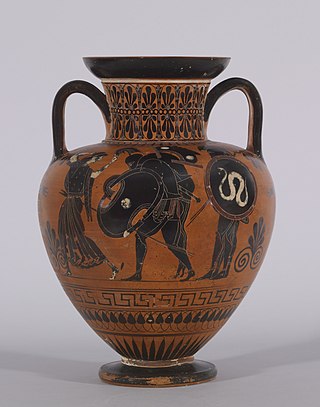
Ajax or Aias is a Greek mythological hero, the son of King Telamon and Periboea, and the half-brother of Teucer. He plays an important role in the Trojan War, and is portrayed as a towering figure and a warrior of great courage in Homer's Iliad and in the Epic Cycle, a series of epic poems about the Trojan War, being second only to Achilles among Greek heroes of the war. He is also referred to as "Telamonian Ajax", "Greater Ajax", or "Ajax the Great", which distinguishes him from Ajax, son of Oileus, also known as Ajax the Lesser.
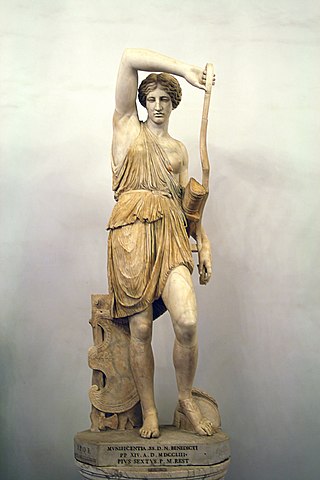
In Greek mythology, the Amazons are portrayed in a number of ancient epic poems and legends, such as the Labours of Heracles, the Argonautica and the Iliad. They were a group of female warriors and hunters who were known for their physical agility, strength, archery, riding skills, and the arts of combat. Their society was closed to men and they only raised their daughters and returned their sons to their fathers, with whom they would only socialize briefly in order to reproduce.

The Trojan War was a legendary conflict in Greek mythology that took place around the 12th or 13th century BC. The war was waged by the Achaeans (Greeks) against the city of Troy after Paris of Troy took Helen from her husband Menelaus, king of Sparta. The war is one of the most important events in Greek mythology, and it has been narrated through many works of Greek literature, most notably Homer's Iliad. The core of the Iliad describes a period of four days and two nights in the tenth year of the decade-long siege of Troy; the Odyssey describes the journey home of Odysseus, one of the war's heroes. Other parts of the war are described in a cycle of epic poems, which have survived through fragments. Episodes from the war provided material for Greek tragedy and other works of Greek literature, and for Roman poets including Virgil and Ovid.
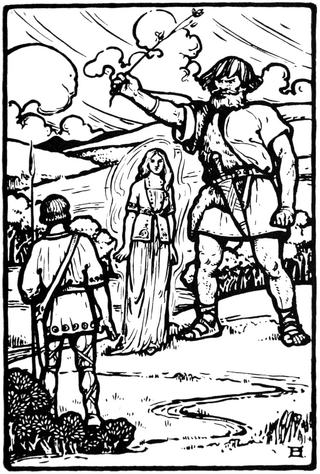
Scáthach or Sgàthach is a figure in the Ulster Cycle of Irish mythology. She is a legendary Scottish warrior woman and martial arts teacher who trains the legendary Ulster hero Cú Chulainn in the arts of combat. Texts describe her homeland as Scotland (Alpeach); she is especially associated with the Isle of Skye, where her residence Dún Scáith stands. She is called "the Shadow" and "Warrior Maid" and is the rival and sister of Aífe, both of whom are daughters of Árd-Greimne of Lethra.

Rākshasa are a race of usually malevolent beings prominently featured in Hinduism, Buddhism, Jainism and Folk Islam. They reside on Earth but possess supernatural powers, which they usually use for evil acts such as disrupting Vedic sacrifices or eating humans.

Arjuna was an ancient prince of the Kuru Kingdom, located in the present-day India. He is one of the main protagonists of the Hindu epic Mahābhārata. He was the third of five Pandava brothers, from the lineage of the Kuru. In the Mahabharata War, Arjuna was a key warrior from the Pandava side in the battle of Kurukshetra. Before the beginning of the war, his mentor Krishna gave him the supreme knowledge of the Bhagavad Gita to overcome his moral dilemmas. In the epic, Arjuna is the closest friend and companion of Krishna.

The Worm Ouroboros is a heroic high fantasy novel by English writer E. R. Eddison, first published in 1922. The book describes the protracted war between the domineering King Gorice of Witchland and the Lords of Demonland in an imaginary world that appears mainly medieval and partly reminiscent of Norse sagas. The work is slightly related to Eddison's later Zimiamvian Trilogy, and collectively they are sometimes referred to as the Zimiamvian series.

Ainu music is the musical tradition of the Ainu people of northern Japan. Ainu people have no indigenous system of writing, and so have traditionally inherited the folklore and the laws of their culture orally, often through music.

The Dagger of Kamui is a Japanese novel series by Tetsu Yano released by Kadokawa Shoten from 1984 to 1985.

Rostam or Rustam is a legendary hero in Persian mythology, the son of Zāl and Rudaba, whose life and work was immortalized by the 10th-century Persian poet Ferdowsi in the Shahnameh, or Epic of Kings, which contains pre-Islamic Iranian folklore and history. However, the roots of the narrative date much earlier.
Đerzelez Alija or Gjergj Elez Alia is a legendary character found in the epic poetry and literature of Bosnia and Herzegovina, Gora, Kosovo and northern Albania. The legendary character is believed to have been a popular Muslim epic hero of the Bosnian Krajina from the end of the 15th century. He is one of the well known legendary heroes and a symbol of brotherly loyalty to both the Bosniaks and Albanians.
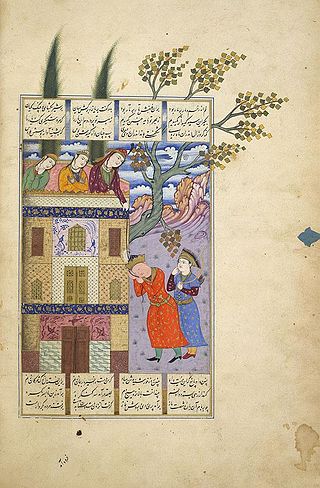
Zāl, alternatively spelled as Zaal, is a legendary Iranian king from Sistan, and is recognized as one of the greatest warriors of the Shahnameh epic. He is the father of the equally legendary Iranian hero, Rostam.
A kamuy is a spiritual or divine being in Ainu mythology, a term denoting a supernatural entity composed of or possessing spiritual energy.
Cikap-kamuy is the Ainu kamuy (god) of owls and the land. He is responsible for overseeing the behavior of humans and kamuy. He is considered a deity of material success.
Wakka-us Kamuy is the Ainu kamuy (goddess) of fresh water. She is also known as Petorush Mat.
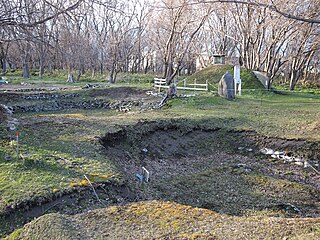
The Okhotsk culture is an archaeological coastal fishing and hunter-gatherer culture that developed around the southern coastal regions of the Sea of Okhotsk, including Sakhalin, northeastern Hokkaido, and the Kuril Islands during the last half of the first millennium to the early part of the second. The Okhotsk are often associated to be the ancestors of the Nivkhs, while others argue them to be identified with early Ainu-speakers. It is suggested that the bear cult, a practice shared by various Northern Eurasian peoples, the Ainu and the Nivkhs, was an important element of the Okhotsk culture but was uncommon in Jomon period Japan. Archaeological evidence indicates that the Okhotsk culture proper originated in the 5th century AD from the Susuya culture of southern Sakhalin and northwestern Hokkaido.
Kotan-kar-kamuy is the creator deity of the Ainu people. He should not be confused with god of the land Kotan-kor-kamuy, or the god of the sky Kandakoro Kamuy.
References
- ↑ Kotan Utunnai. Oxford Reference. 17 November 2005. ISBN 978-0-19-515669-0 . Retrieved 4 September 2017.
- ↑ "Donna Rosenberg – Kotan Utunnai". Genius. Retrieved 2 February 2024.
- ↑ Roberts, Jeremy (2009). Japanese Mythology A to Z. Infobase Publishing. pp. 94–95. ISBN 9781438128023.
- ↑ Rosenberg., Donna (2006), Glencoe world mythology : an anthology of the great myths and epics, Recording for the Blind & Dyslexic, OCLC 74331170 , retrieved 3 June 2021